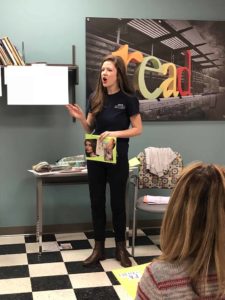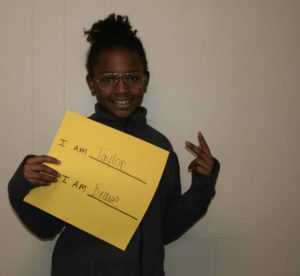UAMS College of Medicine junior Sarah Martin chooses a celebrity magazine from the stack beside her chair in the 12th Street Health and Wellness Center and flips through it. A popular actress graces the cover. Gorgeous couples advertise perfume. Pearly white smiles and flawless complexions fill the pages.
“Do you know anybody who looks like this?” Martin asks the group of pre-teen and teen-age girls and handful of mothers who are gathered around her. “This isn’t real – but society tells you at every turn that if you don’t look like this, you aren’t good enough. Well I am here to tell you, that is a big, fat lie.”
Martin, who is from Conway, Arkansas, and classmate Jordan Fletcher, from Benton, Arkansas, are co-founders of the Confidence Project, which offers one-day educational and confidence-boosting workshops for girls. The Feb. 3 event at UAMS’ student-run free clinic was the sixth that they have led at various venues in central Arkansas since July 2016.

After three educational sessions focusing on nutrition, women’s health and social wellness, participants are invited to have their photo taken while they hold signs that they’ve created to express positive things about themselves.
10-year-old Taylor Giles beamed from behind her statement: “I am Taylor, and I am brave.”
Fletcher, who wants to train in obstetrics and gynecology, and Martin, who intends to pursue surgery, began developing the curriculum during the last half of their freshman year. They were initially concerned that too many girls receive inadequate education about women’s health and sexual wellness.
As they continued their research, they recognized that they could also help girls by improving their understanding of general health and nutrition. Ultimately, they realized that all of these areas were connected to self-esteem and confidence. A curriculum began to take shape.
Martin and Fletcher wrote a 20-page booklet for Confidence Project participants, gleaning information from their medical school training and multiple other sources. They drew on the expertise of nutritionists and adolescent psychologists as well as a key contributor, Laura Hollenbach, M.D., an assistant professor in the Department of Obstetrics and Gynecology.
The program aims to empower girls through education and resources – as well as through the camaraderie of other girls and women. The goal is clear from page 1 of the booklet, which includes a line for each participant to fill in her name, followed by a quote: “She’s a force to be reckoned with.”
Fletcher smiled when talking about some of the transformations that occur during workshops.
“Some of the girls can be very shy coming in,” she said. “They might sit at the back of the room and seem disinterested. But then you notice them slowly start to come out of their shell. They start talking with other girls and asking questions. And by the time they get to the final session of the day, they’re the ones standing up and volunteering to answer what makes them unique and special.”
“It was really fun,” 12-year-old Olivia Jones said at the end of the Feb. 3 program. “All of the girls were really, really nice, and I learned a lot of cool things.” She said she enjoyed the nutrition session most. “I don’t have very good eating habits,” she said, laughing. “So I hope it helps me do better.”
Olivia’s mom, Alena Jones, was impressed as well.
“It’s always great when there are programs that can help you keep an open dialog with your kids,” she said. “In our society now it is really difficult to get them to block out all of the other things they are bombarded with. Programs like this help you come together and listen to each other and find out what they need – things you might not know otherwise. This was a safe environment for asking questions, and to get the perspectives of others.”
Half a dozen other medical students, all female, assisted during the February workshop. When young participants were nervous about a topic, the students helped to keep conversation flowing.
In addition to a host of volunteers, Fletcher and Martin garnered financial support for the project from sources including the UAMS College of Medicine’s ANGELS (Antenatal and Neonatal Guidelines, Education and Learning System) and the Arkansas Foundation for Medical Care.

